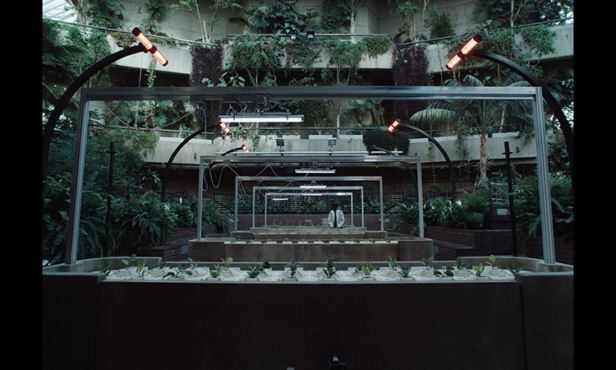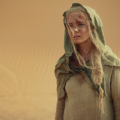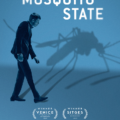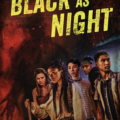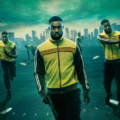Directed by Kibwe Tavares and Daniel Kaluuya, Netflix’s new near-future dystopian thriller The Kitchen finds all forms of social housing eradicated and only ‘The Kitchen’ remaining – a community that refuses to move out of the place they call home.
This is where we meet a solitary Izi (played by Kane ‘Kano’ Robinson), living in The Kitchen by necessity and desperately trying to find a way out. However, when he meets 12-year-old Benji, who has lost his mother and is searching for a family, things for Izi start to get complicated and the unlikely pair struggle to forge a relationship in a system that is stacked against them.
We spoke to Tavares about how his architectural background influenced the look of The Kitchen and why they decided to use Cameo’s ‘Candy’ in a futuristic movie…
A lot of The Kitchen’s central themes and incidents could be set at any time – why set the movie in the near future?
I think it was a few reasons. When we started this I was straight from architecture school and I had some general excitement for the shorts. I was trying to build a film and build off the work that I had done.
Then, creatively for the film, we wanted to see how can we push things to the extreme but still tell a very human story within that. We just found that a really interesting idea because often in sci-fi it might be about the bad guys or the aliens coming and you have to destroy them and we wanted it to be like indie movies that I loved when I was growing. There’s an interesting space there that sits between the two.
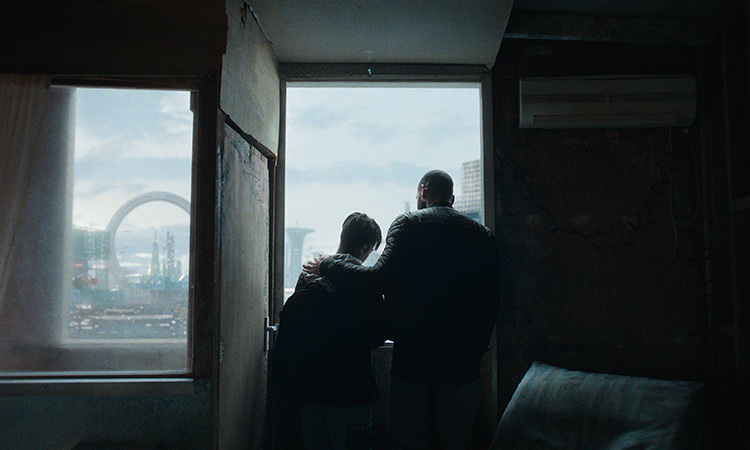
Like all good sci-fi, The Kitchen’s central themes are an important comment on today’s society – what do you think it is about genre movies that give it a good platform to explore such imperative themes?
I think you have a bit more reach. Some of the more art house indie movies that I might love, unless you’re within the film industry, often they don’t reach out of that. Whereas science fiction isn’t like that. It can grab you. It feels like there’s a bit more access to it in a way.
We talk about gentrification, we talk about the idea of getting pushed out and how you can use that landscape and that lens to bring an intimate story, and I do think there are successful sci-fis that do that. A classic one is X-Men, which is like Malcolm X, and Martin Luther King – them having the same problem with different ideologies and different approaches to doing that, and that was the fundamentals of building the comic books and then subsequently the films and the shows that come from that.
Where were your inspirations for the look of The Kitchen district?
It came from a mix of things, We’ve done so much research and we looked at people in different temporary houses all over the world. So there was this one tower in Venezuela called the Tower of David which was a financial tower that didn’t get finished building in the financial crash, and then all these different communities moved in and built a whole ecosystem – that became a really core reference. We looked at places all over the world like favelas. There’s a place in Mozambique, a hotel, that people have moved in to and established their own community.
Then I guess even films like District 9 – the idea that you’ve always got an ominous presence. The London skyline in the background was our spaceship in a way. The impending doom of the people in the kitchen, the idea there’s always something there…
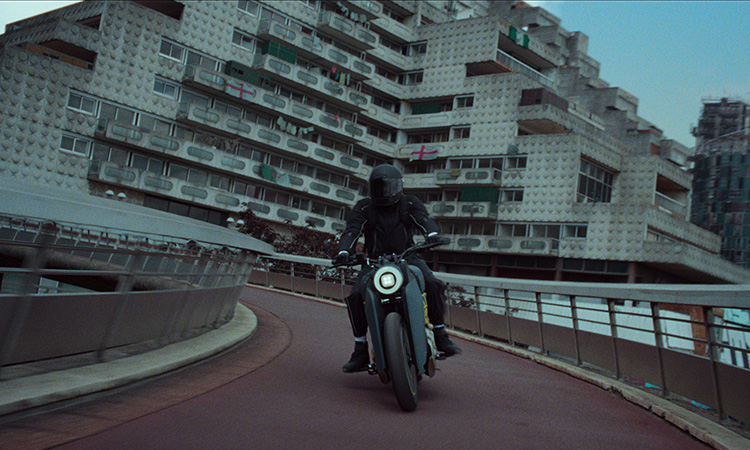
The Kitchen shows a mixture of current and futuristic technology, how did you go about deciding which technology to use in the film?
We spoke to a futurist, I remember very early on inviting them. We’d done a lot of research in different technologies and our thing was that we wanted it to be relatable. But we also wanted it to speak to how London is.
So we’re in this old hotel by Southbank [right now] and then across the river you’ve got all these shiny new towers. London is these weird colours of old and new mixed together and there’s a lot of the past in the future or in the present.
Oftentimes they obliterate everything, and it’s some sort of weird, shiny new place that has no texture or grounding and that doesn’t make you feel like London. In London, you’ve got estates that were built post-war or buildings that were half finished until the financial crash and then eventually finished but with different layers of the different markers of time, at your doorstep, right in front of you in everything you see. So how can we put that into the film?
Speaking of old mixing with the new, we really like the use of Cameo’s ‘Candy’ in the movie. We truly believe we’ll still be doing that dance even in the future…
We tried to build the soundscape the way we built the visuals out – what things stick and what things stay.
If you go to a party now, it’s not like every single song you hear is from this year or last year. So we did try and find music that spoke to the genesis of the project and the ideas and the communities we’re talking about, and how can we layer and build something but also create new stuff and create a soundscape that matches a visual landscape? Those two things meshed together.
Where did the title of the movie – The Kitchen – come from?
It came from ‘Fagin’s Kitchen’. When we first started production we had a sort of Fagin character who used to manipulate these kids to go and steal and pickpocket – a modern version of that which was some of the motorbike robberies and the heist stuff. Then eventually, we lost Fagin and then The Kitchen stuck and it became the name of the place and the title.
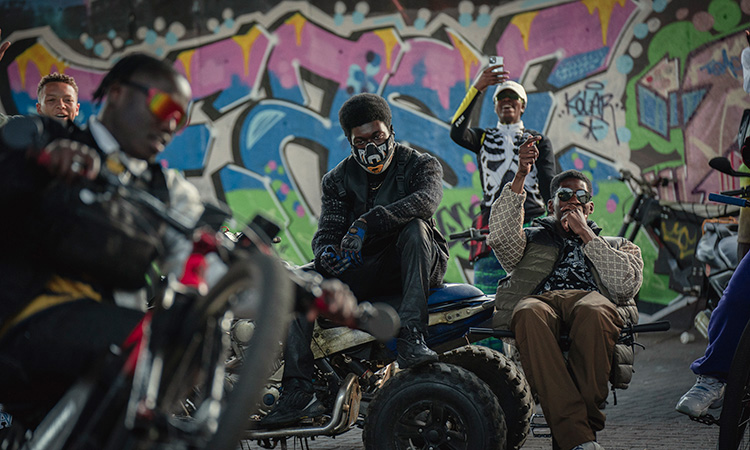
You started talking about this movie back in 2012 when you worked with Daniel Kaluuya for your movie ‘Jonah’. Can you outline the journey of getting the movie off the ground?
Me and Daniel met when I was directing ‘Jonah‘ and then we just started to talk about what we wanted to do in the future and spoke about ideas and how we could start to build our own projects out. How can we drive our own things? How can we articulate our own voice? Then we started to collaborate from that point on.
We started to write more formally in 2014. We started with some workshops, actually, in Daniel’s barber shop, with lots of really talented actors and a very loose little script. We filmed [those workshops] on a 5D and then after showing Film 4 that, and the shorts we’d done, we then went into more formal development.
What was your working relationship with Daniel like as co-directors of the movie? Did you take on different roles?
We’ve worked on it for a long time so we leaned on each other’s strengths in a way. We’ve both got quite different approaches and different backgrounds, and we were doing something that we hadn’t done before in the sense that this is our first feature film – Daniel’s first as a director. So really it was how we combined what we both have and the different approaches to make something.
So it wasn’t a split of days or anything like that because it had to be one thing. It’s really just about how you can lean on each other. Daniel brings so many things, he’s got a wealth of experience, and worked with lots of amazing directors. So he could be like ‘yeah, when I was working with Steve McQueen, he worked like this’. So you have that sort of knowledge and experience and you’ve also got a mix of personalities which helps when you’ve got such a long process.
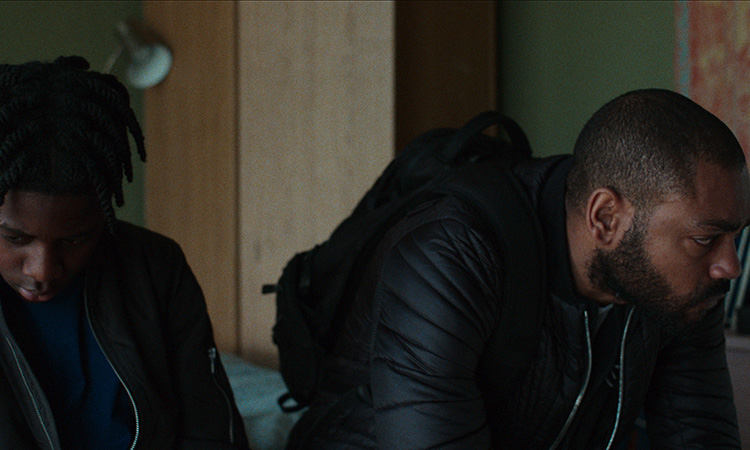
Now that The Kitchen is out, what are you most looking forward to audiences seeing?
I’m most looking forward to audiences just being immersed in it really and feeling connected to the characters; getting immersed in the world that we built and sort of seeing themselves in it. I’m just most excited for people to see it. When you’ve had something at work for so long, you just want people to see it.
The Kitchen will be released on Netflix on 19 January. Read our review of The Kitchen here.
